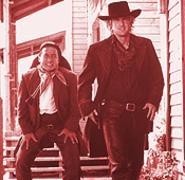Shanghai Noon is not as enervating as its trailer would lead you to believe -- but not by much. It will be forgotten moments after the outtakes montage that plays beneath the end credits, replaced by musty memories of such films as Butch Cassidy and the Sundance Kid, The Frisco Kid, Sergio Leone's spaghetti westerns -- even Wilson's own Bottle Rocket, which he co-wrote and starred in.
To sum up this film's plot is to recount no fewer than a dozen other Jackie Chan films, none more so than 1998's Rush Hour; indeed, it's likely Shanghai Noon was written in the same Word document -- though "written" is perhaps too strong a word when "cut and paste" will do. Once more, with feeling, Chan must travel from China to the United States to rescue a kidnapped female, and he must do so with the reluctant assistance of a wise-ass American. The variations on the theme -- in this go around, the girl is a princess (Ally McBeal's Lucy Liu), and his partner is a white cowboy instead of a black cop -- are nearly beside the point. An urban setting, the Far East, or the Wild, Wild West -- locale (and language, for that matter) is rendered moot when Chan unpacks his bags and spoils for a fight.
Chan's character, an Imperial Guard named Chon Wang, leaves the Forbidden City and arrives in the dusty armpit of Nevada in search of the purloined Princess Pei Pei (Liu, reduced to the background almost immediately); he stumbles across a train robbery being conducted by Roy O'Bannon (Wilson) and his ragtag gang of miscreants and misfits. Roy's a likable rogue, refusing to steal from pretty women; the guy is a giant grin, all teeth and bullshit. But the robbery goes awry -- Roy's an awful crook -- and Roy and Chon wind up deserted in the desert; Roy, quite literally, is up to his neck in the middle of nowhere. It's a nifty way of getting him out of the movie for a long stretch, leaving Chon free to roam the reservation -- where he picks up a peace pipe and, after a stoned one-night fling, gets hitched to a character billed only as Indian Wife (Brandon Merrill), who also appears and reappears throughout the film like a screenwriter's afterthought.
Roy and Chon meet up again in a bar fight. They discover the princess, working on the railroad, during the third hour (or thereabouts -- maybe it just seems like it). For a film that presents itself as being a brisk good time, it bogs down in cinematic quicksand: A montage (set to inexplicable modern-day music by the likes of ZZ Top and Aerosmith) gives way to a fight scene gives way to a montage gives way to a fight . . . and on and on, until the repetition grows numbing. Worse, director Tom Dey and his screenwriters (Alfred Gough and Miles Millar, previously responsible for the arid Lethal Weapon 4) can't decide if they've made a parody or a tribute, so they split the difference -- which amounts to a tepid, smug ripoff. It has neither the guts to play as all-out farce nor the smarts for paying homage; imagine the horrific spawn created by breeding Blazing Saddles with Silverado.
By all rights, this film belongs to Wilson -- and not just because he's already written some of it. The actor, who looks like a cross between a young Dennis Hopper and a prewreck Montgomery Clift, has had a most inexplicable career post-Bottle Rocket. He's not a star; he's a statistic, winding up beaten (The Cable Guy) or dead (Armageddon, Anaconda, The Haunting) in most of the films in which he's appeared. Save for The Minus Man, a lugubrious antithriller in which he plays a drifter who kills with kindness (he offers his victims a tasty, nonviolent poison), he's appeared in films so far beneath him he needs a parachute to reach the set.
Chan, on the other hand, is the closer who's lost five miles an hour off his fastball; it's not enough to render him expendable, but it's just enough to make him vulnerable. The 46-year-old looks as though he's moving in slow motion -- which is even played for gags in one scene, in which he throws tomahawks at two Native American baddies, who snatch them from the wind and hurl them right back. And in the post-Matrix era, his feats seem somehow tame, even cute -- holdovers from a simpler era, when a man didn't need wires and stop-action, digitized tricks to prove his merit. What's dazzling about Jackie Chan is that he can still move at all.


